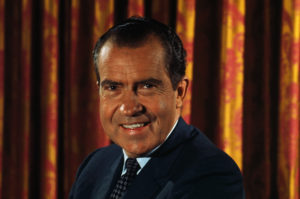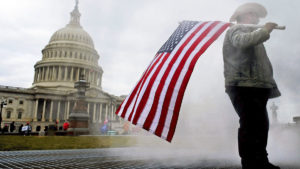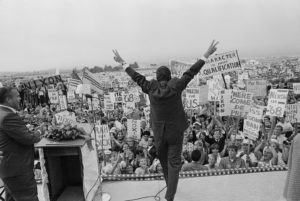Fifty years ago this Friday, the police of Washington, DC discovered a break-in at the headquarters of the Democratic National Committee in the Watergate office complex. When the news first broke, I, like most people, gave it no notice. Within days, however, it was revealed that the intruders were not ordinary burglars. Among them were former CIA operatives who were working in some unknown capacity for President Richard Nixon’s re-election committee.
That got my attention. At the time, I was a member of the White House staff. I ate lunch almost every day in the White House Mess with Chief of Staff Bob Haldeman, Deputy Chief of Staff John Erlichman, and a crowd of other political aides. I wondered if any of them were involved in this very strange political espionage operation.
Fortunately, my presidential appointment had nothing to do with domestic politics. Along with receiving a White House pass, I had been confirmed by the Senate as an ambassador and in practice was working as the president’s chief trade negotiator. Although I carried a diplomatic passport issued by the State Department, Nixon distrusted State. He often used me as his personal representative for sensitive discussions with foreign leaders and officials.
I had served Presidents John F. Kennedy and Lyndon B. Johnson in several posts since 1962 and had decided, when Nixon was elected, to leave my assignment in the Office of the US Trade Representative. But shortly after Nixon was sworn in, a stranger wandered into my office, whom I soon discovered had been sent by the White House personnel office.
The stranger said his name was Murray Chotiner and that he had been Nixon’s campaign manager in California and during his first run for president in 1960. Murray said Nixon had originally planned to give him a presidential appointment after entering office, but the press had characterised him as Nixon’s “dirty tricks manager”, making Senate confirmation problematic. So he was assigned as general counsel in the USTR.
Murray said he had been advised by several members of Congress that I was the best informed official on political and trade disputes with European nations. Could he accompany me on my visits to foreign capitals? I told him I was planning to resign but would stay three months to bring the incoming Nixon team up to speed. Murray travelled with me for about 10 weeks. After a while we became travel buddies, and I came to like his humour and deep insights into politics.
Two years later, in mid-1971, Murray called me to ask if I would be willing to be a consultant to Nixon on international issues, and I agreed. At the start of 1972, Murray called again and said “the President needs you”. I agreed to join his staff full-time and my name was sent to the Senate for confirmation. When I met the president alone, he said he had several international tasks in mind that would likely be subject to political controversy in Washington. When I needed his approval for my decisions or initiatives, he said I could bypass the Haldeman bureaucracy and just tell Murray, who would notify him. “Just don’t tell anyone you have direct access to POTUS.”
In the early days in my new post, Murray took me aside, “Be careful when you speak in or near the Oval Office”, he said. “Recording devices are keeping records of everything said.” This was Haldeman’s idea. A control freak, he wanted to know whatever Nixon was saying or doing with other visitors whenever Haldeman was not present. Murray said he had warned the president that the recordings were a bad idea that would bite him eventually, but Nixon shrugged it off.
As the months rolled on and the Watergate scandal broadened, more and more White House officials and Cabinet officials seemed to be caught covering up inappropriate or even illegal actions.
During this turmoil, I was busy doing my own job. In 1973, for example, Nixon and French President Georges Pompidou agree to hold a Summit in Reyjavik, Iceland, to address US-French tension following Nixon’s 1971 decision to abandon the gold standard. Nixon asked me to accompany him alongside Secretary of State, Henry Kissinger, Treasury Secretary George Shultz, Treasury Undersecretary, Paul Volcker, and other key officials. A special side meeting had been planned for Shultz, Volcker and I to speak with French Finance Minister Giscard d’Estaing. To my surprise, Nixon asked me to do the talking. Later, Shultz explained that Giscard deeply disliked Volcker but seemed to respect me.
When Kissinger and Shultz scheduled a trip to Moscow to meet with Leonid Brezhnev and other high Soviet officials, Nixon asked me to tag along. He also asked me to go to London to assist the Prime Minister’s Cabinet Office in their negotiating UK joining the European Common Market in 1973. After Kissinger laid out a new Pacific security policy framework known as the “Guam Doctrine”, Nixon suggested I go to Canberra and Tokyo to begin dialogue on a potential US economic arrangement with Asia-Pacific nations, which I did.
During 1974, most of my time was spent shepherding Senate approval of the Trade Act of 1974. During this period of Congressional bargaining, Nixon gave me personal authority to sign off with Senate leadership the final drafts of that historic law.
As I was busy doing my job, I saw a building series of actions and cover-ups among the political appointees, resulting in the resignation of the Attorney General, and then successor Attorney Generals and their appointees. A Senate Committee was finally established to investigate the question: was Nixon personally involved in the cover-up? As Senator Howard Baker asked, “What did the President know, and when did he know it?”
It turned out that the president knew a lot. On 16 July, 1973, one of Nixon’s aides, Alexander Butterfield, revealed the existence of the White House taping system in a televised interview, elevating the scandal from a curiosity to a national obsession. Senate investigators demanded the tapes; Nixon resisted, prevaricated, and dragged his feet, but eventually, in 1974, the Supreme Court ruled that the president had to make them available, and he complied. It then became clear that Nixon had long been complicit in the elaborate cover-up. Given the choice of impeachment or resignation, Nixon resigned in order to avoid further damage to the institution of the presidency.
Looking back, I saw catastrophic damage done to a president by a bunch of inept thugs bent on undermining his political adversaries. Sadly, I could not ask Murray for his opinion because he had been killed in a car crash in 1973. I thought Nixon should have fired everyone involved in the Watergate break-in as soon as the illegal raid on the DNC came to light. I remembered Murray’s warning to me that the White House recording system would come back to bite the president someday.
In some sense, history has been unkind to Nixon. Recently, Watergate has been compared to the raid on the US Capitol on 6 January, 2021, no doubt because both involved a presidential scandal followed by high-profile Congressional hearings. But Nixon was no Trump. His decision to cover up the break-in was a regrettable lapse in judgment, but when confronted with evidence that he was personally involved, Nixon chose his country over himself, resigning to avoid the impeachment of a sitting president. Trump, by contrast, sought to overturn a national election, and at no point since has he been willing to admit responsibility or even acknowledge reality.
In my experience, Nixon was an excellent foreign-policy president. He was actively involved in foreign policy and demonstrated more strategic thinking in this regard than most of his successors, even pulling off a handful of impressive diplomatic coups. His domestic policy decisions, on the other hand, were often questionable. But in that — going by the record of America’s more recent presidents — Richard Nixon was hardly alone.
Disclaimer
Some of the posts we share are controversial and we do not necessarily agree with them in the whole extend. Sometimes we agree with the content or part of it but we do not agree with the narration or language. Nevertheless we find them somehow interesting, valuable and/or informative or we share them, because we strongly believe in freedom of speech, free press and journalism. We strongly encourage you to have a critical approach to all the content, do your own research and analysis to build your own opinion.
We would be glad to have your feedback.
Source: UnHerd Read the original article here: https://unherd.com





